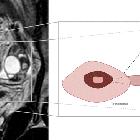Peritoneum

The peritoneum or peritoneal cavity is a large complex serous membrane that forms a closed sac within the abdominal cavity. It is a potential space between the parietal peritoneum lining the abdominal wall and the visceral peritoneum enveloping the abdominal organs. In females, this closed sac is perforated by the lateral ends of the fallopian tubes.
Gross anatomy
The free surface of the peritoneum has a layer of flattened mesothelial cells which are kept moist and smooth by a thin film of serous fluid. The potential peritoneal spaces, the peritoneal reflections forming peritoneal ligaments, mesenteries and omenta, and the natural flow of peritoneal fluid determine the route of spread of intraperitoneal fluid and disease processes within the abdominal cavity.
It can be divided into two main compartments that are separated by the root of the transverse mesocolon: the supramesocolic space above, and the inframesocolic space below.
The peritoneal cavity can also be divided into a greater sac (which is usually used synonymously with the peritoneal cavity) and the lesser sac, which lies behind the stomach.
Innervation
The peritoneum is innervated by
- parietal peritoneum: supplied segmentally by spinal (intercostal and lumbar) nerves innervating the overlying muscles
- diaphragmatic (parietal) peritoneum: supplied by the phrenic nerve (C3, 4, 5), hence referred pain from the diaphragm is felt at the tip of the shoulder
- visceral peritoneum has no afferent supply: pain from diseased viscera is due to muscular spasm, tension on mesenteric folds or involvement of the adjacent parietal peritoneum
- mesenteric root: possesses numerous Pacinian corpuscles (mechanoreceptors) which serves a protective function by causing the reflex contraction of abdominal muscles to support the abdominal viscera during jarring movements of the abdomen which may cause undue traction on their peritoneal attachments
Siehe auch:
- Duodenum
- inframesocolic space
- Mesenterium
- Pankreas
- supramesocolic space
- Bauchhöhle
- Mesocolon transversum
- Kolon transversum
- Eileiter
- Ligamentum gastrosplenicum
und weiter:

 Assoziationen und Differentialdiagnosen zu peritoneal cavity:
Assoziationen und Differentialdiagnosen zu peritoneal cavity:



